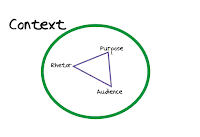
Our world is based on words. They are the way we share our feelings and fears, our hopes and needs. Whether they are signed, written, or spoken, they are the way we communicate with one another.
But imagine that you never understood that words were communicative. You spent your life around them, and maybe even used them to label things in your environment, but you never understood that they could be used to convey your wants and emotions to others.
Imagine that, and you know what life has been like for Nick.
Nick is almost five years old, yet he'd never made the developmental leap that infants master: understanding that the sounds one makes are a way to influence those in the world around him.
The irony isn't lost on me; here I am, the writing teacher who believes in the ultimate rhetorical power of words to shape and change the world, and my own son is oblivious to the power I preach.
But Nick got it today.
It started on Thursday when Jerrud was working with Nick. Nick usually uses PECS cards to communicate, but when Nick was wanting chips, Jerrud was pushing him to say the word. "Chhhh-ip," he modeled for Nick.
For some reason, Nick decided to go ahead and copy Jerrud. And magically he was rewarded with the chip he wanted and lots of praise.
Nick didn't think that was so bad, so he played along again. And got his chip.
He started putting the pieces together: "I say this group of phonemes, and someone gives me a chip. Cool."
Friday, Saturday, and Sunday we practiced the word "chip." Sometimes I'd manipulate the situation, getting chips and then asking him what he wanted as he drooled over my stash (actually, that's also how I taught him to use his first PEC, which was a chips card). Other times he'd request chips all on his own, bringing me his chips PECS card but saying the word when he made the exchange.
Today, though, Nick learned to transfer the skill he learned with the word chip to other contexts.
First it was "pretzel." But the cutest imaginable version of the word *ever*. It was more like two words, actually: "Pweh. Zil!" After some frustrations, he deftly navigated through the linguistic landscape, saying "chip" when that was what he wanted and "pretzel" when he wanted something different.
Of course, salty snacks make a child thirsty, so how about some juice? I filled his cup with apple juice . . . and he said the word when he wanted Jerrud to give him the cup! Awesome!
So we spent the early afternoon cycling through these three words when I got curious. What else would he say?
I brought in a 16-ounce bottle of Coke, which he loves. I gave him a choice between the apple juice and the Coke. "Nick, what do you want?"
"Co," he answered.
Sweet!
I hunted down a bag of M & Ms, and my child asked for the candies, over and over and over again, by saying "M" (this worked for me; I mean, there's just one "m" on the candy so why should I make him say two of 'em?).
Next I brought him some cookies, and again, success.
Nick has had some language since he was one year old, back when he'd read the letters and numbers off the license plates of cars. He's babbled in his own language, and he's labeled things in his environment as he attends to them. But his words only reflected context. Today, though, my son became a rhetor and learned about audience and purpose. He realized that he could guide his audience (me) to a specific purpose (to get him stuff he wanted).
How many times I have drawn that tired old triangle on the board in my writing classes, telling my students how important it was that their message take into account audience, context, and purpose? I preached it for years . . . but I never really understood its significance until today, when my child finally put all three together and opened a door to a new world.
No comments:
Post a Comment